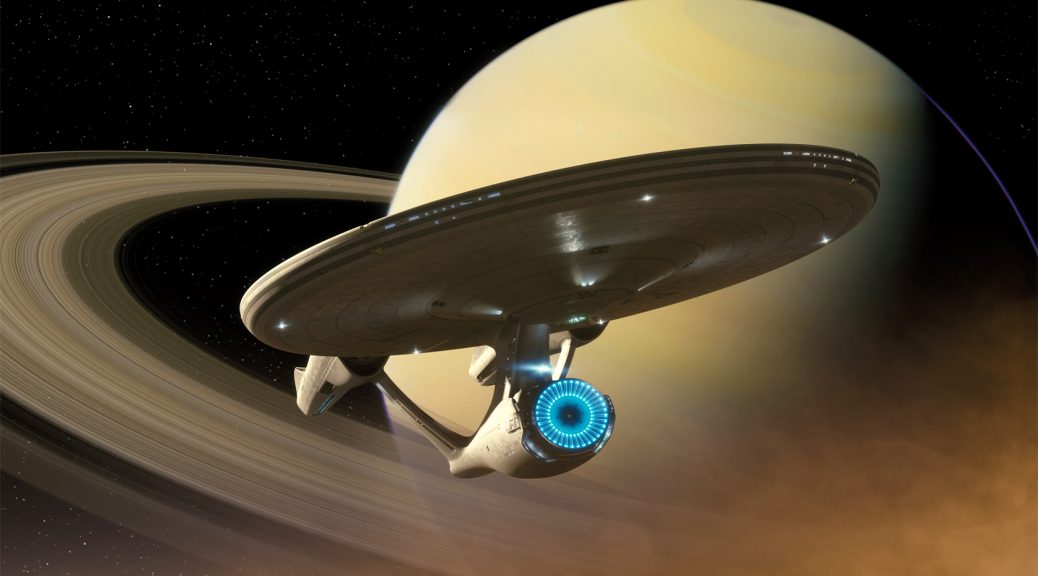 See the film BEFORE reading the following:
See the film BEFORE reading the following:
Old Formula, New Potion: Star Trek is cerebral, scientific, progressive, techno-babble and uses science fiction ALL for the SAKE of social commentary in present day society. Unfortunately, movies that are pedantic rarely entertain the masses. So, this central theme has been largely jettisoned in the film. If you wanted these Old ideas, Star Trek will always be a television show (1966-69) that spawned a genre within a genre. Sure, the writers of Transformers might have seemed problematic to Trekkies, but their crafty plot construction demonstrates a sound knowledge of adrenaline stimulation techniques…you know what I mean…they’ve boiled Star Trek to its essential emotional strengths.
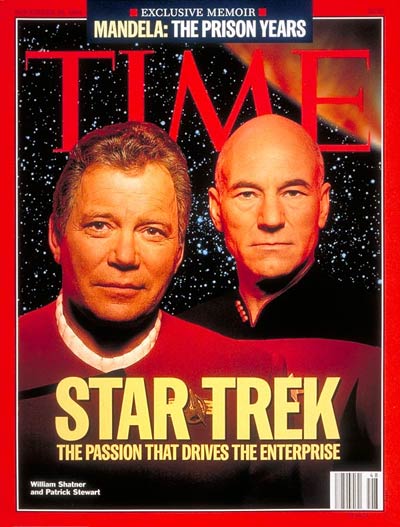
It’s the Characters, Stupid: J.J. Abrams has taken on some of the old formula for this film: vengeful villains from another time: Khan et al, quick conclusion, all the catch-phrases, similar acting styles but ultimately, Abrams knows; it’s the characters that matter. You can actually believe that these are real people in the 23rd century not some stilted cardboard cutouts masquerading as h.u.m.a.n.s. Battlestar Galactica (2004-2009) successfully demonstrated on television, where Star Trek shows frequently didn’t, that characters matter in science fiction as they engage audiences in the moral challenges everyone faces as part of the human condition. Focusing more on the character development of Kirk and Spock is rewarding for J.J. Abrams who knows that these iconic characters are more salient than the ideas behind Star Trek…at least for the Silver Screen.
 The Villain as Secondary: like Batman Begins, the villain is simply not the most significant device for dramatic intrigue…Star Trek is primarily about the dynamic between crewmembers Spock and Cadet turned Captain Kirk. One might lament the limited screen time, the substance of Nero’s raison d’etre and simplicity/banality of the villain. Yes, he is similar to Khan (the revenge driven nemesis) but without the character depth {sinister laughter: whahahahahehehehe}….there is a method to this madness, fools. J.J. Abrams must have discerned that the real narrative is the reintroduction of the old personalities from the original show. The villain is not the story in a reboot….
The Villain as Secondary: like Batman Begins, the villain is simply not the most significant device for dramatic intrigue…Star Trek is primarily about the dynamic between crewmembers Spock and Cadet turned Captain Kirk. One might lament the limited screen time, the substance of Nero’s raison d’etre and simplicity/banality of the villain. Yes, he is similar to Khan (the revenge driven nemesis) but without the character depth {sinister laughter: whahahahahehehehe}….there is a method to this madness, fools. J.J. Abrams must have discerned that the real narrative is the reintroduction of the old personalities from the original show. The villain is not the story in a reboot….
The Surprise Approach: J.J. Abrams knows how to surprise people. When the island on ‘Lost’ started dancing, we were all surprised…The point is that J.J. Abrams’ approach is nothing like dramatic irony, or other narrative devices that intrigue, it is built on the foundations of Steven Spielberg’s career: withhold over 75% of the valid information from audiences. Q: How close is Sulu from being impaled in this scene? A: It seems really really close from this angle….but wait!….not actually: you’ve just been Spielberg(ed). Limiting valuable contextual information leaves the audience guessing, it constructs mental puzzles in the viewers mind. What will Nero do to Captain Robau onboard the Romulan mining vessel? We do not know but it is suspenseful simply watching an elevator travel to the battered USS Kelvin’s docking bay…most importantly what’s inside this Mystery Box? (above)
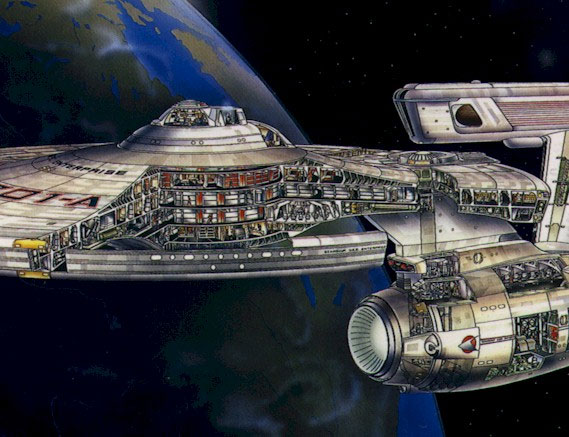 Revision of Star Trek interiors: who would have thought that Engineering makes more sense with industrial factory aesthetic rather than as a large technical looking room with a gated corridor or a glowing vertical tube? Superficial but significant; the division of labour is more pronounced than ever before in Star Trek (2009). This adds to the realism that is been attempted here. In addition, flashing lights and great cinematography make audiences feel like they’ve gone where no one has gone before;-)
Revision of Star Trek interiors: who would have thought that Engineering makes more sense with industrial factory aesthetic rather than as a large technical looking room with a gated corridor or a glowing vertical tube? Superficial but significant; the division of labour is more pronounced than ever before in Star Trek (2009). This adds to the realism that is been attempted here. In addition, flashing lights and great cinematography make audiences feel like they’ve gone where no one has gone before;-)
Vulcans As Analogous to Actual Victims of Mass-Murder: Just one demonstration of Star Trek being social commentary; the destruction of Vulcan creates a new historical narrative for Vulcans & Spock. Spock has always been treated as a unique outsider then he becomes more isolated when 6 Billion Vulcans are murdered by a violent imbecile who has the power to exact revenge against an entire group of people: this sounds familiar. J.J. Abrams et al have created a similar subtle social commentary in Star Trek. The use of an analogous narrative to remind audiences of the very real human tragedy of the Holocaust or any Genocides may not seem obvious because the destruction of Vulcan is too abstract. It does, however, produce emotional depth serving as a new Spock character dynamic since his Vulcan rationality could not retrieve the people, history and family he has lost: a common crisis of identity after horrendous crimes against humanity: see (for example)
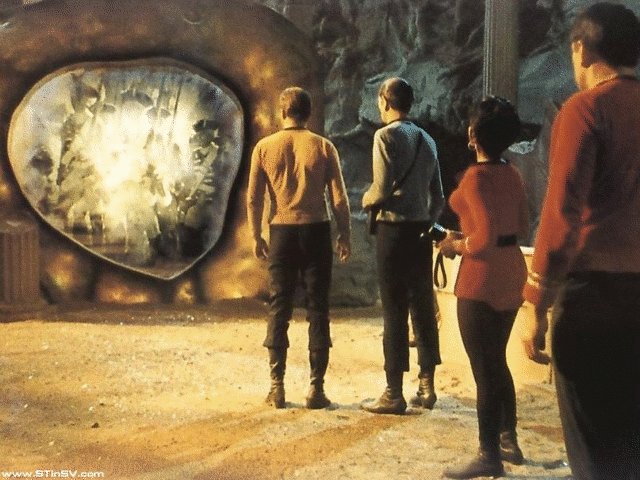 Circumventing Star Trek Canon: The film passes Trekkie rigour by rejecting the canonical problems created by being bound to over 500 episodes of the multiple television shows. Fans of the show were upset when the Enterprise (2001-05) series encountered the Borg before Jean Luc-Picard’s “first encounter.” There are a myriad of other cases. Instead, J.J. Abrams et al have completely circumvented the Star Trek canon issue by rewriting the Star Trek universe using a time-travelling lunatic. Given the plot of the new film, J.J. Abrams will be able to rationally refute Trekkie complaints. In addition, the circumvention of canon means that NEW adventures about old narratives can be revised: the Star Trek II: Wrath of the Borg anyone?…blah
Circumventing Star Trek Canon: The film passes Trekkie rigour by rejecting the canonical problems created by being bound to over 500 episodes of the multiple television shows. Fans of the show were upset when the Enterprise (2001-05) series encountered the Borg before Jean Luc-Picard’s “first encounter.” There are a myriad of other cases. Instead, J.J. Abrams et al have completely circumvented the Star Trek canon issue by rewriting the Star Trek universe using a time-travelling lunatic. Given the plot of the new film, J.J. Abrams will be able to rationally refute Trekkie complaints. In addition, the circumvention of canon means that NEW adventures about old narratives can be revised: the Star Trek II: Wrath of the Borg anyone?…blah
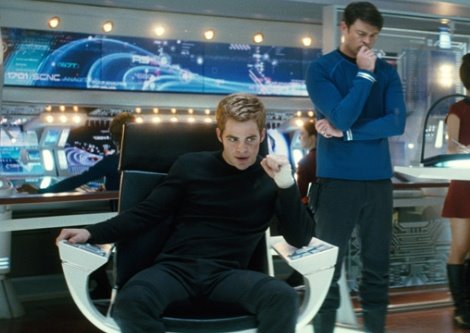
The Agency of Kirk: even with the alternate timeline, J.J. Abrams et al assume that Kirk will still ascend to the captain’s chair. The writers imply that even with different structural factors, fate would find a way. This completely rejects social scientist that would state that socio-economic status, environmental conditions etc might have a major impact on the development of a person. Instead, it implicitly endorses a religious-like predeterminism and the will of an individual (agency) to achieve whatever they want too…reflecting the optimism of the original Gene Roddenberry ‘s wagon train pioneers in space.
None Of The ABOVE Matters: that’s because this film was too GOOD. Star Trek (2009) is easily among the top five greatest science fiction films ever released. When you leave the cinema having been thrilled, having possibly laughed and even cried, you realize that this is what going to the movies should be about….&
After having grown-up with Star Trek Next Generation,
After having made countless cardboard, duct-taped, plastic models of the USS Enterprises as a kid,
After seeing Star Trek VI and subconsciously falling in love with Shakespeare before I knew who the Bard was,
After being ridiculed for wearing a Star Trek costume on Halloween, for riding my bike into warp-speed,
After being teased by everyone I knew as a kid….
AFTER ALL THAT, a film that non-Trekkies are talking about enthusiastically makes me (professor nerdster) feel like part of the diplomatic armada that “has always been & always shall be your friend“; Star Trek. I’m a nerdster, after all….

